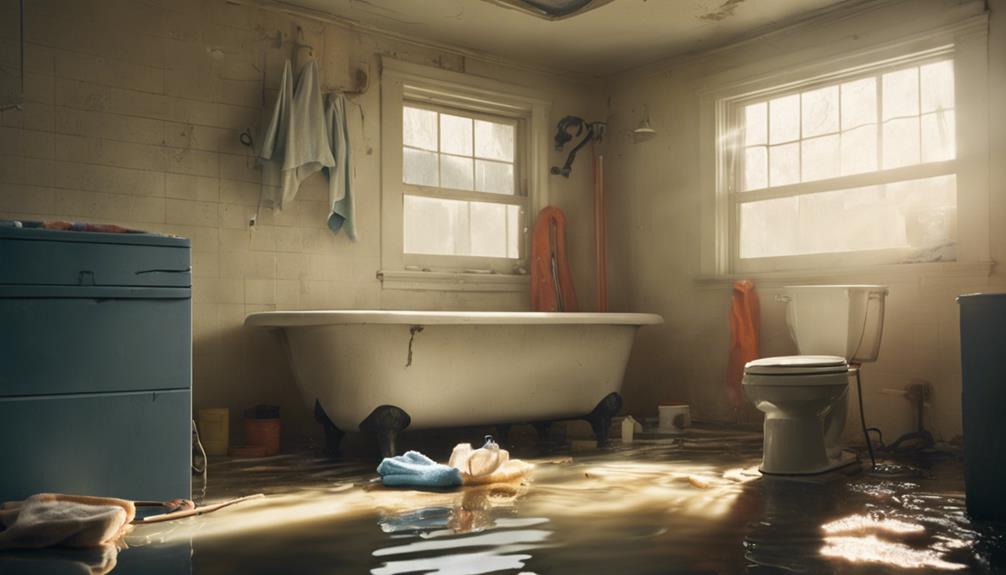
If a plumber causes water damage in your home, start by assessing the situation and documenting the damage with photographs. Reach out to the plumber immediately, explaining what happened and documenting all communications. Don't forget to notify your insurance company to start the claim process promptly. Move any salvageable belongings to a dry area and consider hiring a restoration professional to mitigate further damage. Review your homeowner's insurance policy and understand your rights regarding plumber liability. With these steps, you'll be better prepared to handle the situation effectively and protect your interests. There's more to explore on this topic!

When faced with water damage from a plumber's mishap, the first step is to quickly assess the situation. Start by identifying the visible signs of water damage in your home, like water stains on ceilings, damp walls, or wet floors. These indicators help you assess the extent of the damage and prioritize your response.
It's important to document the damage through photographs and descriptions, as this can aid in the insurance claims process, especially if you have insurance coverage for water damage.
Next, locate the water source. If it's still leaking, turn off the main water supply to prevent further issues. While doing this, don't forget to check potential hazards, especially electrical risks. Water exposure can compromise outlets and wiring, so ensure safety first.
After addressing immediate concerns, evaluate the structural integrity of the affected areas. Look for any compromised beams or supports; these could pose serious safety risks.
If you spot any issues, it's crucial to act quickly, as structural damage can escalate.
Reach out to the plumber right away to let them know about the water damage caused during their service.
Be sure to document all your communications, including dates and details, so you have a clear record of the situation.
This will help ensure they take responsibility and have the chance to fix the issue.
Water damage can be a frustrating and stressful situation, especially when it results from plumbing work. Your immediate communication with the plumber is crucial. Start by contacting them as soon as you notice the issue. Explain the water damage in detail, highlighting the extent of the damage, including any visible signs like water stains or structural concerns. This clarity helps the plumber grasp the seriousness of the situation.
As you communicate, make sure to document all communications, noting the dates and times of your calls or messages. This record not only tracks your efforts but can also support any future insurance claims or legal actions.
Give the plumber a chance to respond and address the issue. They may have solutions or be willing to send a technician to assess the damage firsthand.
Keep a close eye on their response time and any actions they take. This information can be vital for your records, especially if you need to escalate the matter later on.
Documentation is essential in managing the aftermath of water damage caused by plumbing work. Start by immediately contacting the plumber responsible for the job. Inform them about the water damage, providing specific details about what you've observed. Clearly communicate the extent of the damage, including visible water stains, any structural issues, or affected materials.
Allow the plumber a chance to respond to the issue; they might offer to fix the problem or guide you on the next steps. During this interaction, it's crucial to document everything. Keep a record of all communications with the plumber, noting dates, times, and the content of your discussions. This documentation will be invaluable, especially if you need to file insurance claims or take legal action later.
Additionally, track the plumber's response time and any actions they take to address the problem. This information can bolster your case if disputes arise.
Effective documenting not only helps you manage the current situation but also ensures you have a solid foundation for any future claims or communications regarding the water damage.
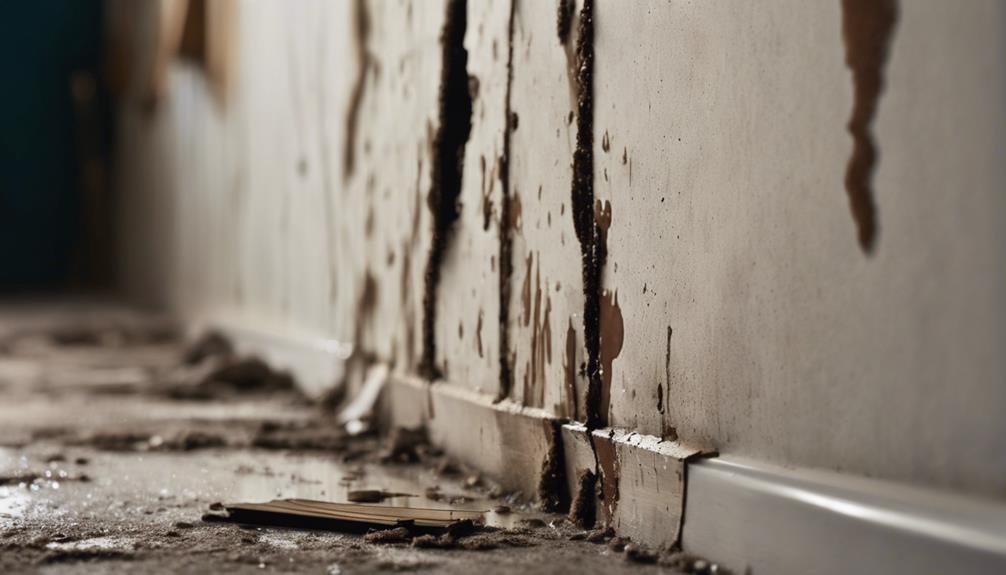
When water damage occurs, documenting the situation is crucial for a successful insurance claim.
You'll want to capture clear photos and videos of the affected areas and keep a detailed log of your observations.
Gathering all this evidence promptly will help streamline the reporting process and support any reimbursement claims.
How can you ensure that your insurance claim is successful after experiencing water damage caused by a plumber? The key lies in thorough documentation. By keeping detailed records, you can substantiate your insurance claims and protect your coverage.
Here are four crucial steps to follow:
Being organized with your documentation not only helps you navigate the claims process but also ensures you're informed about what's needed for coverage verification and damage assessment.
Taking these steps can significantly improve your chances of a successful claim.
To support your insurance claim effectively, gathering the right types of evidence is vital. Start by taking clear and detailed photographs of the water damage. Capture multiple angles and document the extent of the affected areas to serve as visual evidence. This documentation will be crucial in demonstrating the severity of the situation.
Next, maintain a written log that outlines the timeline of events. Include when you discovered the damage and any communications with the plumber regarding the issue. This record will provide context for your claim.
Collect receipts and invoices for any immediate mitigation efforts, like water removal or repair services. These will support your claim for damages.
Don't forget to gather any relevant correspondence with your insurance company, including claim numbers and representative names, to show your proactive approach.
If possible, include video evidence that shows both the damage and the plumbing work that caused it. This can offer a more comprehensive understanding of the situation for your insurance claim.
Documenting water damage promptly is crucial for a successful insurance claim. Following timely reporting procedures ensures you have the evidence needed for your homeowners insurance policy.
Here's how to effectively document the damage caused by the plumber:
Organizing and storing all documentation in one place can significantly aid in the claims process with your insurance company.
Once you've identified water damage caused by a plumber, it's crucial to notify your insurance company promptly. Contact your homeowners or renters insurance as soon as possible to report the incident and initiate a claim process.
Be prepared to provide comprehensive details about the damages, including the plumber's contact information, the nature of the damage, and any documentation you've collected, like photos or invoices.
Inquire specifically about the coverage for repairs and replacements related to contractor-caused water damage, as insurance policies can vary significantly in their inclusivity. Understanding your coverage will help you gauge what expenses might be covered and what you may need to pay out of pocket.
Follow the insurance company's guidance closely on the next steps, such as scheduling an inspection or making any adjustments to your claim.
It's essential to keep thorough records of all communications with your insurance provider, including dates, times, and the names of representatives you speak with. This documentation will support your claim and ensure a smoother claims process.
Prompt action and clear communication can make a significant difference in how quickly you receive assistance for the damages.
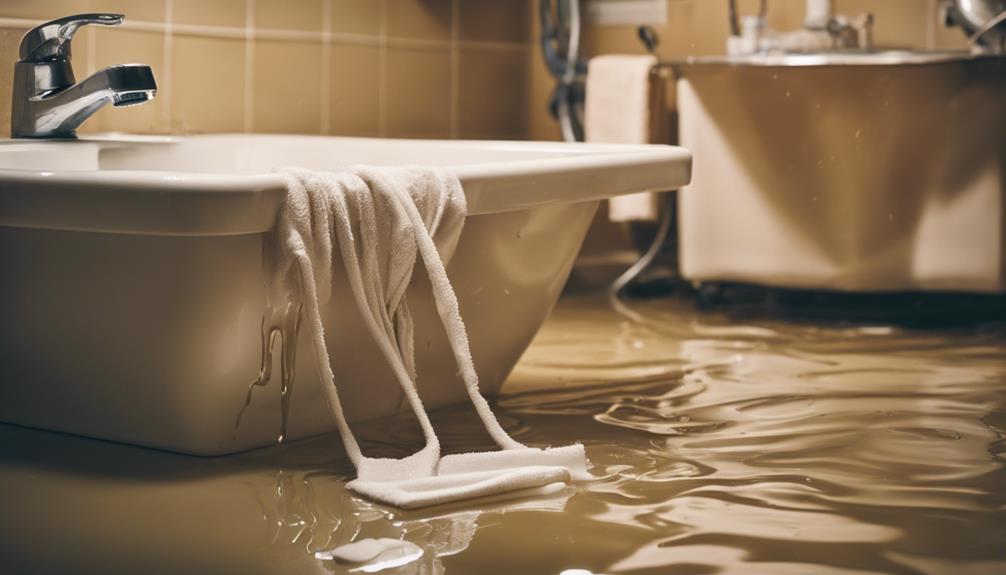
Once you've stopped the water flow, it's crucial to assess the damage right away.
Contact your insurance company to report the incident and document everything thoroughly for your records.
This proactive approach will help you navigate any claims and ensure you're protected from further loss.
When faced with water damage caused by a plumber's mishap, it's crucial to act swiftly to prevent further issues.
Start by assessing the immediate impact of the situation. Here's what you should do:
Additionally, move any salvageable items to a dry location and use towels or a wet/dry vacuum to remove standing water.
By taking these steps, you'll not only minimize the damage but also create a clear record of the incident, which might be helpful later on.
Acting quickly can save you from more extensive repairs down the line.
Water damage can be overwhelming, but contacting your insurance company promptly is essential to prevent further complications.
Start by reaching out to your homeowners or renters insurance to report the water damage caused by the plumber. Make sure to provide them with all relevant details, including the plumber's contact information.
It's crucial to inquire about the specific coverage for water damage in your policy, as these details can vary, especially concerning contractor-related incidents.
Once you've reported the damage, follow the guidance provided by your insurance company. They'll instruct you on how to proceed with filing a claim and any necessary water damage restoration steps.
Keep a detailed log of all communications with your insurance provider, such as dates, times, and the names of representatives you speak to. This log will help you track the progress of your claim and ensure that you have a clear record of your interactions.
An insurance adjustor will likely visit to assess the damage, so being prepared with documentation can only strengthen your case. Taking these steps will help you navigate the process efficiently and minimize further damage to your home.
After contacting your insurance company, it's time to focus on documenting everything thoroughly to prevent further damage.
This documentation will be vital for your claims process and any potential disputes with the plumber.
Here's how to ensure you have solid evidence of the damage:
In the wake of water damage caused by a plumbing mishap, calling a restoration professional is crucial for minimizing further issues.
An experienced restoration contractor can provide a quick response to mitigate the damage, ensuring that your property doesn't suffer more than necessary. They utilize specialized equipment for effective water extraction and drying, significantly reducing the risk of mold growth.
These professionals are trained in water mitigation techniques, allowing them to preserve salvageable materials while safely removing those that are unsalvageable.
Their expertise not only helps in restoring your property but also adheres to industry standards and protocols, which can be vital for your insurance claims.
Engaging a restoration company can facilitate smoother communication with your insurance provider, as they'll provide necessary documentation and assessments.
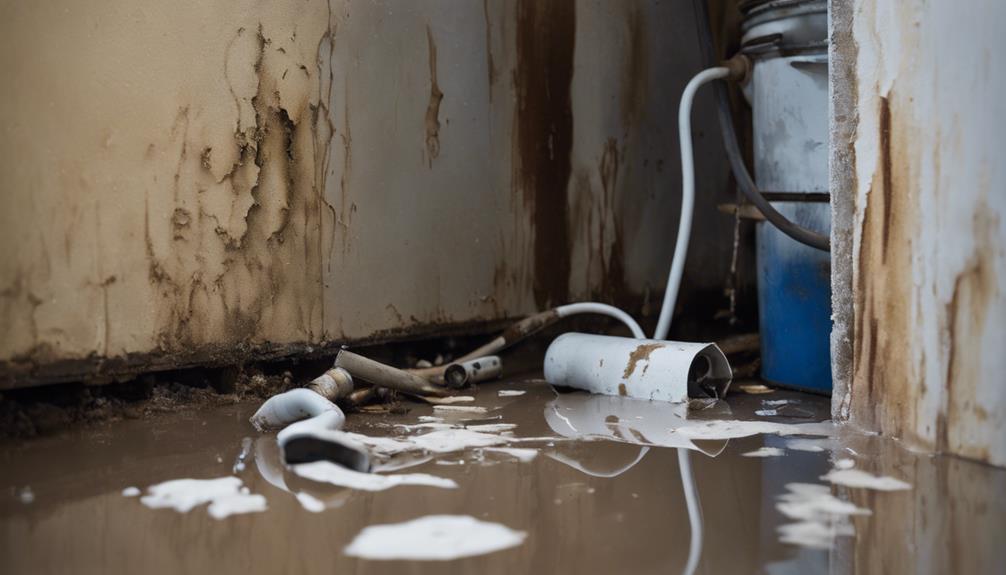
Understanding your rights as a homeowner is essential when dealing with water damage caused by a plumber's negligence. You might be entitled to compensation through your homeowners insurance policy. Here's what you should consider:
If the job isn't completed satisfactorily or damage occurs, you have grounds for disputing payment or even pursuing legal action.
Knowing your rights and taking proactive steps can help you navigate this challenging situation effectively.
Knowing your coverage is vital when dealing with water damage from a plumber's negligence. Your homeowners insurance typically covers such damage, but it's essential to review your policy specifics to understand the extent of your coverage. This includes repair costs, cleanup, and restoration expenses, which depend on the terms outlined in your policy.
Be aware that some policies may exclude damage resulting from poor workmanship. This makes it crucial to verify your coverage limits with your insurance agent. Regularly reviewing your homeowners insurance policy ensures you have adequate protection against incidents caused by contractors.
In addition to understanding your policy, it's a good idea to document all communications and details of the damage before filing a claim. This documentation will help facilitate the claims process and provide necessary evidence to your insurance provider.
If the plumber has contractor liability insurance, it may also be beneficial to explore that avenue for compensation. Ultimately, knowing your coverage can make a significant difference in how you handle water damage and any financial implications that arise.
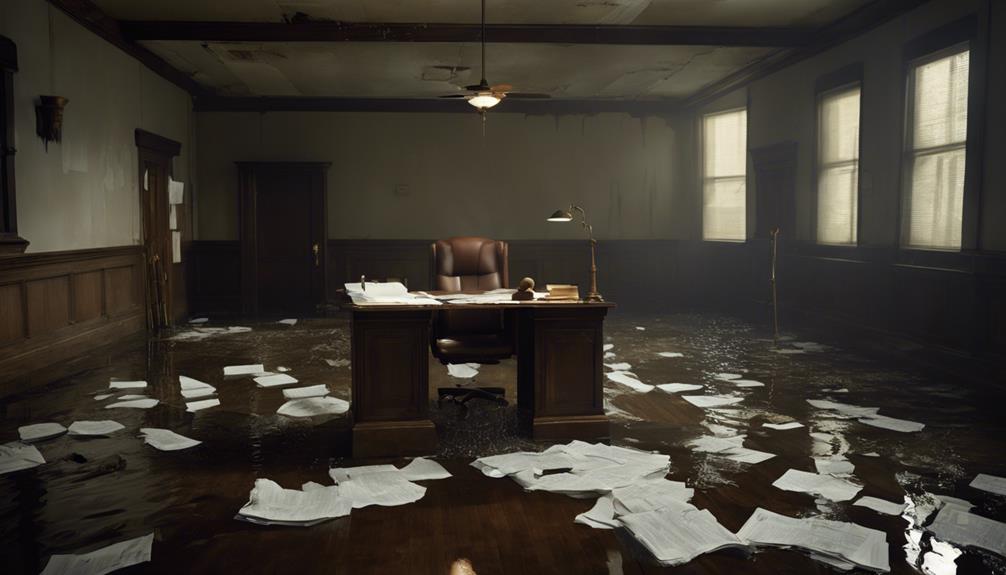
When dealing with water damage caused by a plumber, seeking legal advice is crucial for protecting your rights and exploring potential claims against the contractor. Consulting a legal professional can help you understand the complexities surrounding contractor liability insurance and your homeowners insurance coverage.
Here are some key steps to take:
After addressing the legal aspects of water damage caused by a plumber, the next step is ensuring you hire a reputable professional for any future plumbing needs.
Start by researching potential plumbers in your area. Check online reviews, ratings, and referrals to gauge contractors' reputations. A solid reputation often indicates quality work and reliability.
It's crucial to verify information about the plumber you're considering. Confirm they carry adequate liability insurance and workers' compensation insurance. This coverage protects you from potential damages or injuries during the job.
Don't hesitate to request and review their credentials, including licenses and certifications, to ensure their qualifications are legitimate.
Before any work begins, ask for a detailed estimate outlining all costs involved. This step helps avoid unexpected expenses and ensures clarity on the scope of services provided.
When a plumber makes a mistake, like negligent plumbing, it can lead to serious issues, including leaks and water damage.
You might face liability issues if the damage is extensive. It's crucial to understand your homeowner rights; you could file insurance claims to cover repair costs.
Document the damage and consider preventative measures for the future. Open communication with the plumber may help resolve the situation before escalating it further.
Yes, water damage can be fixed in your house.
The restoration process typically involves water extraction, drying, and repairs to affected areas. You should consider professional services, as they use specialized equipment for thorough drying.
Don't forget to review your homeowner rights; insurance claims might cover some costs, especially if negligence is involved.
Also, remember to follow prevention tips to avoid future issues, ensuring your home stays safe and dry.
To fix water pipe damage, start by using effective pipe repair techniques.
Shut off the water supply and assess the damage.
Employ water extraction methods to remove excess moisture, followed by drywall replacement tips if needed.
Implement mold prevention strategies to safeguard against future issues.
Document everything for the insurance claim process, and ensure you maintain your plumbing system regularly to prevent future leaks.
With these steps, you can restore your home efficiently.
Yes, a broken pipe can definitely cause significant water damage.
When you experience pipe leaks, it's crucial to act quickly. Water restoration efforts can prevent further property damage and reduce repair costs.
Contact an emergency response team to address the leak immediately. Remember, plumbing insurance often covers these incidents, but you'll need to document everything for a successful claim.
Don't wait too long, as mold can develop within days!
When a plumber causes water damage, it's crucial to act quickly. Assess the situation, document everything, and reach out to your plumber and insurance company right away. Don't forget to prevent further damage and know your rights. Understanding your coverage can save you a lot of stress, and if necessary, seek legal advice. Lastly, for future plumbing needs, always hire a reputable plumber to avoid similar issues. Take these steps, and you'll be on your way to recovery.